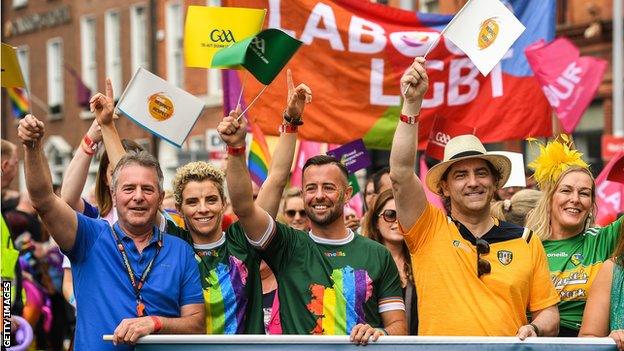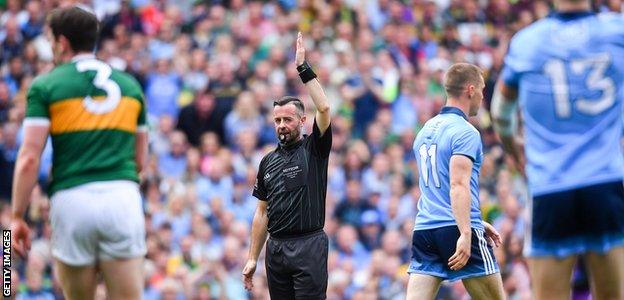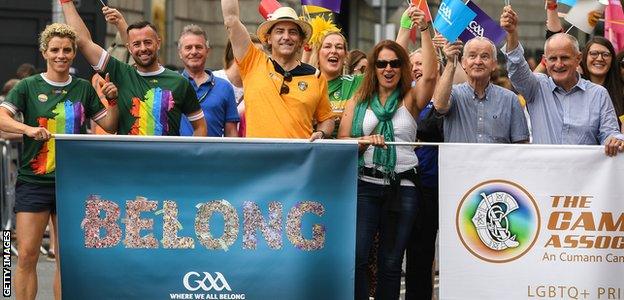LGBT+ History Month: GAA referee David Gough on self-acceptance 10 years after coming out
- Published

Gough (middle) helped represent the GAA at 2019 Dublin Pride
Every year on 31 January, David Gough receives a phone call from his parents.
It is not in itself a remarkable happening, he speaks to his parents most days. But on this particular date the conversation is of special significance, it is an anniversary call.
Ten years ago, aged 27, Gough revealed to his family that he was gay. It is an event worth celebrating.
"It's an anniversary definitely, and I would mark it ever year," he told Sportsound Extra Time, as part of their LGBT+ special that airs at 18:05 GMT on Monday 22 February.
"My parents would always ring me on that day, they ring me most days anyway, but that day in particular there's always the conversation about the year."
Since coming out Gough has become one of the top referees in inter-county GAA, and the Meath man took charge of the 2019 All-Ireland final.
David Gough
Through living as an openly gay man Gough has found a happiness he could only have dreamed of previously, but the right to celebrate his identity has not always been afforded.
In 2015, Gough was denied permission to wear a rainbow wristband while officiating a league match between Dublin and Tyrone, which he wanted to display in order to highlight the ongoing fight for equality in sport and to show his support for the 'Yes' vote in the upcoming referendum on same-sex marriage in the Republic of Ireland.
"I feel to a certain extent that I've survived 10 years as an openly gay man because I would have had so many fears beforehand about coming out," he reflects.
"It's six years next month since I made the stance in Croke Park in an attempt to wear the rainbow wristband.
"Those occasions need to be celebrated as changing occasions in my life. Where I had a huge sense of courage and was able to let people see who I really was."
'For The Time of Necessary Decision'
It was a poem from County Clare philosopher John O'Donohue that prompted Gough to come out to his parents.
"I stumbled across this poem called 'For The Time of Necessary Decision', and by the time I had read down through the poem there were tears streaming down my face," Gough said.
"The poem could have been written exactly for where I was in my life right then in that moment. It talked about you kind of just existing, going through this increasingly grey nowhere where you felt you had to come alive to live again.
"It was all about having the courage to take that step into the unknown, and trusting that a richer life would meet you there and that you'd have lost nothing, only that vacant endurance that you were existing.
"I couldn't believe that words could have such an impact on me emotionally, and in that moment of clarity I decided that was it."

Gough took charge of the 2019 All-Ireland final between Dublin and Kerry
Having spent the weekend trying to find the courage to speak to his parents, Gough finally heeded the advice of O'Donohue and trusted that a brighter life would follow once he took the step.
"It was met with silent and uncertainty. To a certain extent they had their own worries and thoughts to process, thankfully it didn't take them the four years it took me, they came on their journey much quicker.
"What I realised was that they only wanted me to be happy. And once I was happy and comfortable, that's all that mattered to them.
"After a while and reflecting on it they realised that none of that was really important. They could see how much happier I was as a person when that weight had been lifted off."
'Sport needs more gay role models'
As his family recognised a happier person, so too did Gough's own GAA club Slane, although he did not come out to his team-mates for another four months.
With fears of how his relationship with team-mates may change upon revealing his sexuality to them, Gough, a senior footballer who had not missed a championship match in 10 years, distanced himself from the side to the point where he missed a match.
"The lads were going 'where's Goughie? Why hasn't he turned up?' I had told the manager, 'Jim I can't come this weekend, I don't want to talk about it but when I can I will' and obviously he didn't know what was going on at all," Gough recalls.
"The team won that day and that evening the captain picked up the phone, they were in the pub having a few drinks, he said 'there's a few rumours going round here today as to why you didn't play the game today, is there something up?'
"I said I had other stuff one and he said 'The rumours are... I'm not going to believe it or say it until you tell me' and I said 'yes the rumours are true, I am gay and I would struggle now at the moment going back into the dressing room environment, I don't want you guys to feel overly conscious around me that you can't laugh or have a joke, or that some of you are afraid all of a sudden to be showering with me or what that perception is'.
"They were like: 'We don't really care, we just want you to play football. You're supposed to be on the high stool beside us having a few gin and tonics.'
"It just completely calmed me, and I just went back to paying football."

2019 marked the first time the GAA took part in Dublin Pride
Gough's profile within the GAA, and his willingness to share his own experience, means he is often contacted through social media by men seeking advice as they struggle to come out to their loved ones.
The volume of contact is, says Gough, evidence of the work to be done within the sporting sphere to make it an inclusive place for the LGBT+ community.
"There are no high profile male athletes out in Irish sport or world sport," said Gough.
"People generally don't know many out gay athletes in the world, and that's a huge problem because as a young person growing up I didn't have the role models I needed, the positive male out gay sporting models that I needed.
"This is something that you cannot carry for your entire life. You only have one chance of this life we're only passing through it and you only get one shot at it, and if you're carrying that weight through your whole life you're wasting your life when you could be so much happier and it's such a better position personally.
"There's a huge amount of self-confidence that comes with self-acceptance."
Hear the full interview on Sportsound Extra Time: LGBT+ Special at 18:05 GMT on Monday 22 February on BBC Radio Ulster